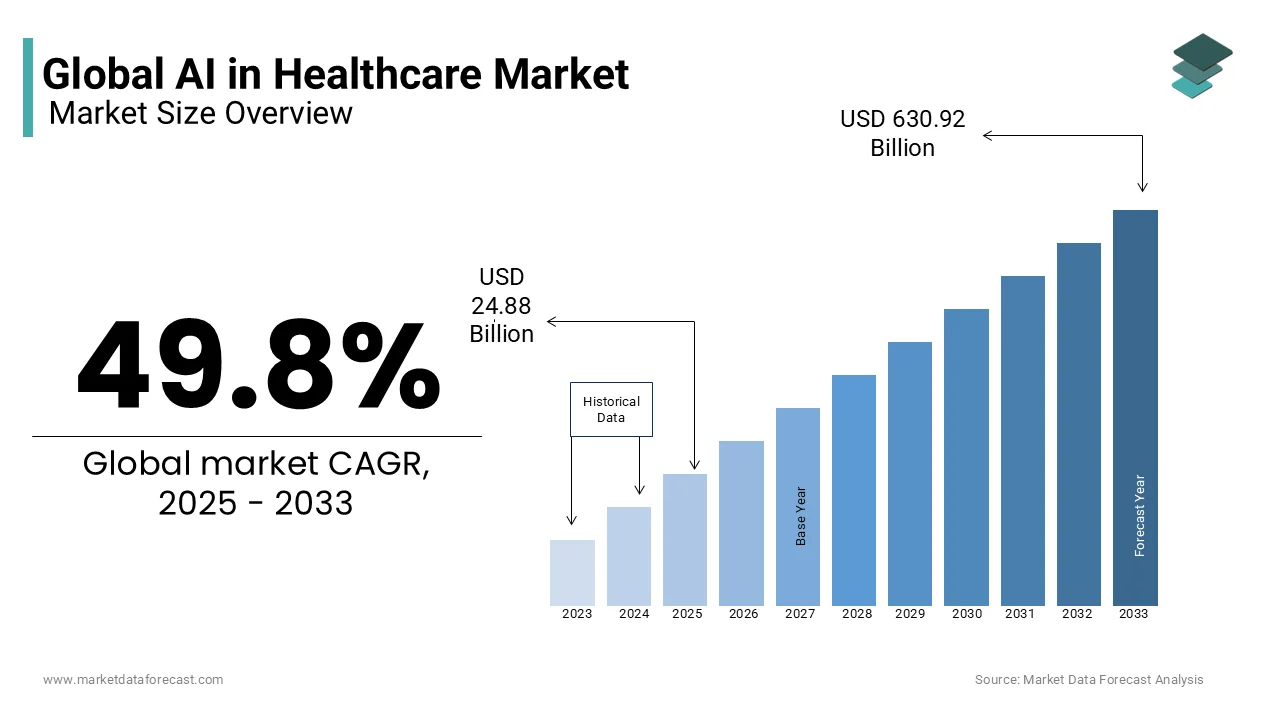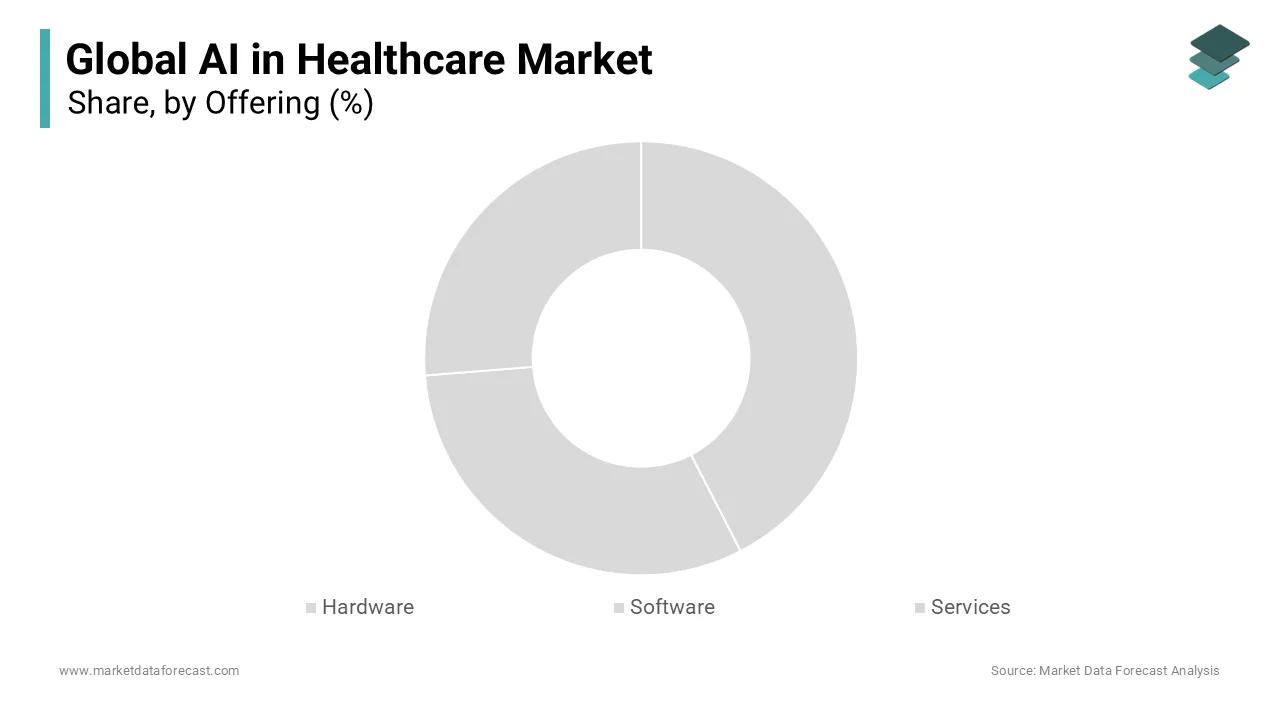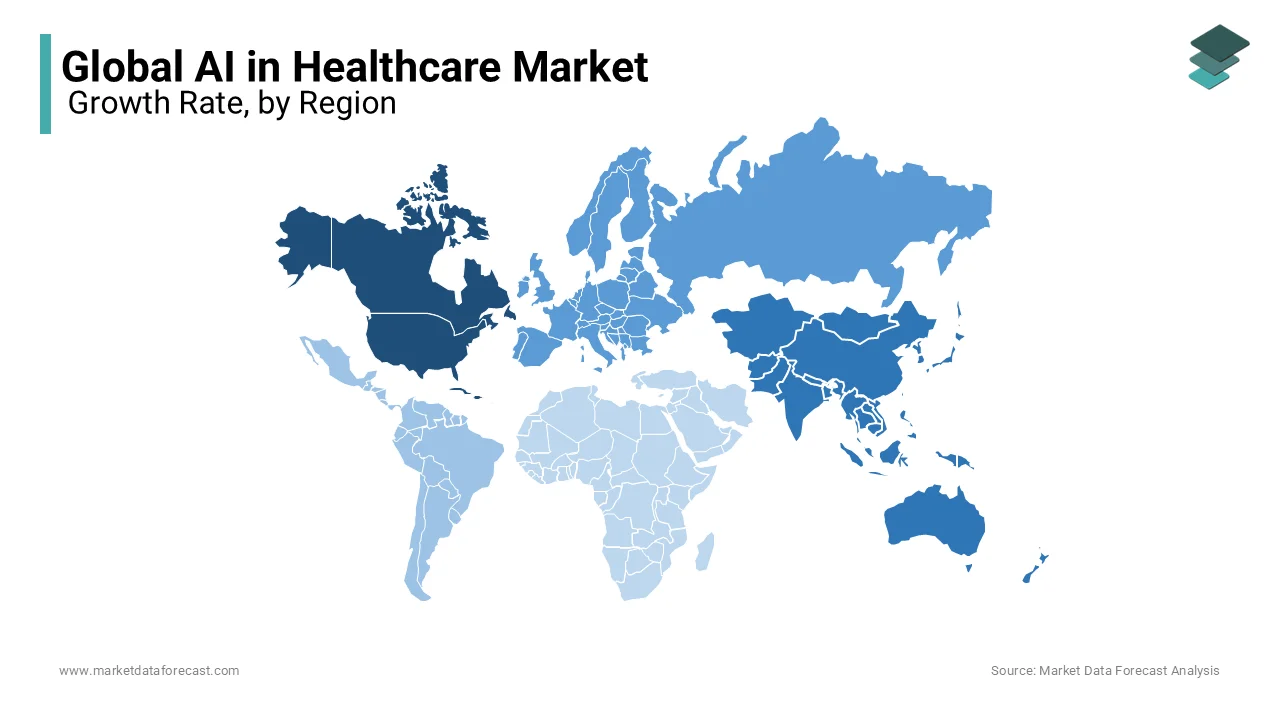Global AI in Healthcare Market Size, Share, Trends & Growth Forecast Report By Offering (Hardware, Software, and Services), Algorithm (Deep Learning, Querying Method, Natural Language Processing, and Context Aware Processing), Application (Robot-Assisted Surgery, Virtual Nursing Assistant, Administrative Workflow Assistance, Fraud Detection, Dosage Error Reduction, Clinical Trial Participant Identifier, Preliminary Diagnosis, and Others), End-User (Healthcare Provider, Pharmaceutical & Biotechnology, Patient, and Payer) & Region (North America, Europe, Asia Pacific, Latin America, and Middle East & Africa), Industry Analysis From 2024 to 2033
Global AI in Healthcare Market Size
The global AI in the healthcare market size was valued at USD 16.61 billion in 2024 and is expected to register a whopping CAGR of 49.8% from 2025 to 2033. The global market size is anticipated to be valued at USD 630.92 billion by 2033, from USD 24.88 billion in 2025.

Artificial intelligence (AI) has revolutionized healthcare by designing treatment plans, helping with repetitive tasks, managing medications, and discovering medications. It can also be used effectively for health data management through data collection, storage, and standardization. Each year, massive amounts of data are generated in the healthcare sector, and the ever-growing volume of big data has created the need to adopt artificial intelligence technology to manage data effectively. Recently, Google's artificial intelligence research division launched its Google DeepMind Health project to extract data from medical records to provide better and faster health services.
MARKET DRIVERS
Rapid Penetration of AI in the Healthcare Industry
The growing decline in the doctor-patient relationship where AI is offering new solutions to bridge the gap between healthcare staff and patients is boosting the adoption of AI in healthcare and enhancing market growth. The presence of various benefits of AI, such as the ability to improve patient outcomes, the need for greater coordination between healthcare workers and patients, increased adoption of healthcare medicine precision, and a significant increase in venture capital investments are all driving the adoption rate in the healthcare industry leading to market expansion globally. The growing importance of big data in healthcare is expected to fuel market growth. The growing adoption of AI systems in various fields of the healthcare industry is fuelling the market growth rate. The improving technological advancements in AI systems are likely to fuel market growth. The increasing advancements of AI-based tools for elder care and the increasing potential of emerging markets such as China and India are expected to create opportunities for market expansion.
The necessity for adopting clinical workflow solutions, declining resources, budget constraints, and lack of clinical SOPs and standard procedures are primarily driving the expansion of AI in the healthcare market. The growing adoption of IT in the healthcare industry is estimated to offer various solutions in the medical industry. The growing geriatric population with chronic illnesses, increasing demand for personalized medicine, the need for efficient and rapid diagnostic methods, and a better understanding of the disease at the initial stage are all raising the demand for AI in the healthcare industry, leading to enhancements in the market revenue. According to NCBI study reports in 2020, AI-based algorithms accurately detected 68% of the COVID-19 cases as positive, diagnosed as unfavorable by healthcare professionals in 25 patient datasets. The increasing government support initiatives, growing mergers and acquisitions, and collaborations with IT among the market players and healthcare organizations are accelerating the adoption of AI in healthcare by increasing the market growth opportunities. The increasing penetration of AI in healthcare is enhancing the market players' focus on product innovations, increasing advanced and effective product launches, and escalating the global market size expansion. AI-based robotics-assisted surgeries are gaining traction worldwide, creating opportunities for global market expansion during the forecast period.
MARKET RESTRAINTS
Reluctance of Healthcare Professionals to Adopt New Technologies
High costs associated with implementing and maintaining the systems and increasing concerns about privacy and security are hampering the global market growth. As the complete patient information is stored in cloud-based systems, the chances of cyberattacks and data breaches are higher, hindering market expansion. The stringent regulatory framework for product innovations, launches, and approval of various medical procedures assisted with AI-based algorithms is estimated to impede global market share growth. The high costs of research and development, clinical risks, and difficulties in medical procedures are estimated to limit the market growth opportunities during the forecast period. Slower and limited adoption in underdeveloped and developing nations is estimated to hamper market growth.
REPORT COVERAGE
|
REPORT METRIC |
DETAILS |
|
Market Size Available |
2024 to 2033 |
|
Base Year |
2024 |
|
Forecast Period |
2025 to 2033 |
|
CAGR |
49.8% |
|
Segments Covered |
By Offering, Algorithm, Application, End-User and Region |
|
Various Analyses Covered |
Global, Regional, & Country Level Analysis; Segment-Level Analysis; DROC, PESTLE Analysis; Porter’s Five Forces Analysis; Competitive Landscape; Analyst Overview of Investment Opportunities |
|
Regions Covered |
North America, Europe, APAC, Latin America, Middle East & Africa |
|
Market Leaders Profiled |
Welltok, Inc., Intel Corporation, Nvidia Corporation, Google Inc., IBM Corporation, Microsoft Corporation, General Vision, Inc., Enlitic, Inc., Next IT Corporation, iCarbonX. The other players in the value chain are Shimadzu Recursion Pharmaceuticals, Inc., Siemens Healthineers, General Electric (GE) Company, Koninklijke Philips N.V., Cloudmedx, Inc., Bay Labs, Inc., and others. |
SEGMENTAL ANALYSIS
By Offering Insights
The software segment is dominated by the most significant share of 41.3% in the global market in 2024, and the domination of the software segment is expected to continue throughout the forecast period. The increasing adoption of AI-based software solutions among healthcare providers and patients drives the segment growth. The growing penetration of AI-based software technologies in various healthcare applications like cybersecurity, clinical trials, virtual assistants, robot-assisted surgeries, telemedicine, and dosage error reduction are all enhancing the adoption of AI-based software, propelling the market growth.

The hardware segment is expected to register a prominent growth rate in the global market over the forecast period.
By Algorithm Insights
The deep learning segment is expected to grow at the highest CAGR over the forecast period due to the increased use of signal reduction, data mining, and image recognition, which are integral components of most AI. Deep learning systems work through artificial neural networks (ANNs). These interconnected layers of neurons help provide extensive brain structure, fueling segment growth. Deep learning excels in tasks like imaging and detecting diseases through X-rays and MRIs for precise analysis. The deep learning algorithm's benefits drive its growth and enhance global market expansion. Deep learning predicts the molecular interactions in drug development and precision medicine, identifies drug targets, and implements treatment based on the genetic profiles of individuals, propelling the market expansion.
The natural language processing segment is estimated to grow prominently during the forecast period. NLP enables the extraction of valuable information from research papers and clinical notes in drug discovery and diagnosis procedures.
By Application Insights
The clinical trials segment dominated the global market with a significant market share in 2023 and is expected to have a prominent CAGR during the forecast period. The increasing penetration of AI in research and the drug development process primarily drives the segment growth. The growing investments by the market players and government funding support in clinical trials, drug design, and development for new drugs are leading to enhancements in the market revenue in this segment. The growing patent expirations and need for advanced, safe, and effective drugs fuel the necessity of clinical trials, leading to segment growth. The adoption of AI in clinical trials helps reduce errors, enhances the accuracy of results, and provides rapid results, where all these benefits raise the adoption rate and augment the market growth.
The virtual nursing assistant segment is expected to have significant market growth opportunities during the forecast period. The increasing penetration of the internet in most devices, the growing use of smartphones, and improving internet access are all raising the demand for virtual assistants, leading to segment growth. The rising adoption of telemedicine is increasing the use of healthcare apps, which is increasing the adoption of virtual assistants, which guide patients in using the mobile application, propelling the market expansion.
By End-User Insights
The healthcare providers segment dominated the global AI healthcare market with a significant market share in 2023. The healthcare providers include hospitals, clinics, and diagnostic centers, which widely adopt AI-based software and solutions, driving the segment growth. The generated AI has wide applications in enhancing diagnostic procedures, optimizing patient care, and streamlining medical processes; all these AI technologies have enhanced the accuracy of diagnostics and improved the efficiency of healthcare, augmenting the adoption of AI by healthcare providers. The growing R&D investments and increasing government support for advancements in the healthcare industry are boosting the segment growth.
The patient and payer segment is estimated to have a steady growth rate during the forecast period. The integration of smartphones and wearables involves healthcare applications. The generated AI is helping people track fitness, vital signs, sleep patterns, and activity levels, which is estimated to drive the segment in the coming years.
REGIONAL ANALYSIS
The North American region held the dominant share with a significant CAGR during the forecast period. The growing adoption of advanced and latest digital technologies in all sectors, including the healthcare industry, and the presence of advanced healthcare infrastructure, IT, and telecommunications across the North American region is majorly driving the global market expansion. The rising prevalence of various chronic diseases and the accelerating patient pool demand new and innovative diagnosis and treatment methods, which enhance the adoption of AI in healthcare across the North American region. The presence of significant market players in the U.S. and Canada, increased volume of hospitals, and various research show that half of the U.S. population is suffering from chronic illness, which fuels the regional market expansion. The growing government initiatives and stringent regulations by the regulatory authorities are making it mandatory to store and manage complete patient data in digital forms as per the regulations, augmenting the market expansion.

The Asia Pacific region is estimated to have the fastest growth during the forecast period due to rising government investments in the development of the healthcare industry. The increasing investments in IT and healthcare infrastructure, emerging markets in China and India, and rising adoption of AI-based algorithms in healthcare are majorly driving the global market in the region. The rising prevalence of chronic diseases and the increasing geriatric population fuel the market expansion. According to a report from the National Library of Medicine 2023, the Asia Pacific region is considered home to 60% of the global population, accounting for half of the cancer cases and 58% of cancer-related deaths worldwide. These scenarios are enhancing healthcare providers' adoption of AI services and solutions, propelling the growth of regional market share.
KEY MARKET PLAYERS
Companies playing a dominating role in the global AI in healthcare market include Welltok, Inc., Intel Corporation, Nvidia Corporation, Google Inc., IBM Corporation, Microsoft Corporation, General Vision, Inc., Enlitic, Inc., Next IT Corporation, iCarbonX, Siemens Healthineers, General Electric (GE) Company, Koninklijke Philips N.V., Cloudmedx, Inc. and Bay Labs, Inc.
RECENT HAPPENINGS IN THE MARKET
- In November 2023, Koninklijke Philips collaborated with Vestre Viken Health Trust to deploy an AI manager platform that enhances radiology workflows. The AI-enabled bone fracture application for diagnosis allows radiologists to focus on complex cases.
- In October 2023, Microsoft launched new data and AI solutions, Microsoft Cloud, at the HLTH 2023 conference to influence healthcare organizations to enhance patient and clinician experiences.
- In October 2023, Harman, a subsidiary of Samsung Electronics, launched HealthGPT, an innovative Healthcare Private Language Model. This advancement focuses on enhancing patient care, medical research, and decision-making.
- In September 2023, Oracle introduced a generative AI service for healthcare organizations. The Oracle Clinical digital assistant, integrated with Oracle's EHR solutions, helps providers perform tasks through voice commands, which enhances patient care.
- In January 2023, Amazon Web Services and Slalom LLC collaborated with an agreement where this collaboration helps to strategize and develop AI-powered solutions for healthcare, life sciences, and financial services industries.
MARKET SEGMENTATION
This research report on the global AI in the healthcare market has been segmented and sub-segmented based on offering, algorithm, application, end-user, and region.
By Offering
- Hardware
- Software
- Services
By Algorithm
- Deep Learning
- Query Method
- Natural Language Processing
- Contextual Processing
By Application
- Robot-Assisted Surgery
- Virtual Nursing Assistant
- Administrative Workflow Assistant
- Fraud Detection
- Dosage Error Reduction
- Clinical Trial Participant Identifier
- Preliminary Diagnosis
- Others
By End-User
- Healthcare Providers
- Pharmaceutical & Biotechnology
- Patient and Payer
By Region
- North America
- Europe
- Asia Pacific
- Latin America
- MEA
Frequently Asked Questions
What are the major applications of AI in the healthcare sector?
AI is extensively used in healthcare for applications such as medical imaging and diagnosis, drug discovery, virtual health assistants, predictive analytics, and personalized treatment planning.
How does AI impact healthcare professionals and their roles?
AI augments healthcare professionals' capabilities by assisting in diagnosis, treatment planning, and patient management. It allows them to focus more on patient care and decision-making while automating routine tasks, leading to increased efficiency and productivity.
How is AI utilized in medical imaging and diagnostics?
AI algorithms are trained on vast datasets of medical images to assist radiologists and clinicians in interpreting images more accurately and efficiently. AI also enables early detection of diseases such as cancer and improves the accuracy of diagnostic tests.
What are the future prospects for AI in healthcare?
The future of AI in healthcare holds immense potential, with advancements expected in areas such as genomics, telemedicine, remote patient monitoring, and AI-driven robotic surgery. Continued innovation and collaboration between healthcare and technology sectors will drive further transformation in healthcare delivery and patient outcomes.
Related Reports
Access the study in MULTIPLE FORMATS
Purchase options starting from
$ 2500
Didn’t find what you’re looking for?
TALK TO OUR ANALYST TEAM
Need something within your budget?
NO WORRIES! WE GOT YOU COVERED!
Call us on: +1 888 702 9696 (U.S Toll Free)
Write to us: sales@marketdataforecast.com